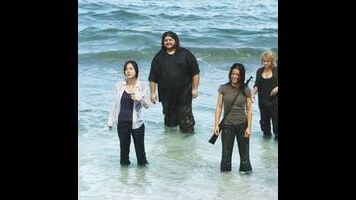Lost: "S.O.S.," etc.

When we first started doing Inventory a couple of years ago, I pitched one about "Most Startling TV Deaths," for which I planned to write about Roz falling down the elevator shaft on L.A. Law, Kellerman shooting Luther Mahoney on Homicide (and later getting killed himself in a different role on The Shield), and Michael bumping off Ana-Lucia and Libby on Lost. I watched that episode ("Two For The Road") again this week, and it's still a stunner, because there's no real groundwork laid for it. Yes, when Michael returns to camp and gives his little speech about how The Others are small in number and pathetic in nature, it's obvious that he's either deluded or working an angle. But nothing in Harold Perrineau's performance or the scenes leading up to the shooting really give the game away. The way Michael reacts to his own misdeeds–and the way the action pauses for a beat or two before he sets Ben free and shoots himself–keeps the viewer in a state of disorientation. It's a great plot twist, masterfully conveyed.
So then, with the whole of Lost fandom on the edge of its collective seat, what did the writers do the next week, for the episode "?"? They sent Lock and Mr. Eko out into the jungle to find a mystery hatch, at the prompting of a dream, all while flashing back to Eko's days in Australia as a fake-priest/miracle-debunker. And yet, just like the time-wasting episode that precedes "Two For The Road"–the Bernard-and-Rose-centered outing "S.O.S."–"?" is an entertaining, thematically rich 40 minutes, even if it cools down a story that had been building up a pretty good boil.
Heading down the stretch of Season Two, Lindelof and Cuse and company found a pretty good groove, as they teased out the island action and the impending conflict between the castaways and The Others, all while distracting viewers with flashbacks that informed us about Rose's cancer, Ana-Lucia's relationship with Christian Shepherd, the unreliability of Claire's psychic, and Michael's three-minute reunion with Walt (relayed in the on-island flashback episode "Three Minutes").
That's why it pains me to report that contrary to my memory, the endgame to Season Two is sloppily played–starting with "Three Minutes," and continuing through the ungainly two-hour finale "Live Together, Die Alone". At the time, watching Michael get dragged to The Others' fake camp, and following Sayid and Jin/Sun on their sail around the island (complete with four-toed giant statue!), and learning what happens when Locke stops pushing the button, and the big finish with the two dudes at the icy station sending word to Penny…all of that was jaw-droppingly exciting. And some of it still is. But the second time around, Michael's visit with The Others looks more pointlessly vague, and Michael's angst veers from heartbreaking to annoying, and Locke and Eko's button-obsession comes off far too goofy and shrill, and most jarringly, the way Jack and Michael convince Hurley to come along on their trek to The Others' camp feels completely phony.
This I think is a pertinent question about Lost in general: Why does Hurley have to join the hunting party? I mean, in a practical sense, his presence is explained: Ben wants to him to carry a message back to the beach. But let's be honest: That's a lame reason to put him on the list, and Hurley's reason for playing along–because he's so grief-stricken over Libby–is a pretty big stretch. No, the real reason Hurley goes to see The Others is the same reason that Charlie helps Mr. Eko try to dynamite open The Swan: Because these are major characters on the show, and they need something to do.
In my interview with Lindelof and Cuse (going up next week!), Lindelof repeated something to me that he's said to other interviewers about the occasional logical lapses on the show: that all TV shows do this, and at that when it comes down to storytelling versus plausibility, storytelling comes first. And I'm sympathetic to that point of view. Like I said, when I watched these Season Two episodes as they originally aired, I was suitably shocked and delighted by all the twists and turns. But I also asked "Darlton" about whether they see Lost as one big story (like a novel) or a bunch of little stories (like TV), and I probably didn't pursue that line of questioning enough. Because on a second viewing, some of the storytelling decisions that make sense for a TV show—meant to be seen by people once a week for an indefinite amount of time—don't make as much sense for a complete 100-hour movie that people can sit down and watch in big chunks. example: The way The Others' disguise themselves as ragamuffins. That's more for the viewing audience's benefit, to keep us guessing, more than for the castaways'.
Understand that I'm really just nitpicking here. I enjoyed Season Two, and really like a lot about how it ended. There's some delicious tension when the gut-shot Libby turns out to still be alive, and Michael has to sweat out whether she's going to spill the beans; and I love the haunted look on his face when he cleans up the blood of the people he killed. But the piling on of irony and in-jokes–combined with the rushed attempts to satisfy fan complaints though awkward bits of dialogue like Sawyer musing, "So do you think The Others are ex-Dharma, or….?"–really doesn't play so well on repeat viewings. As I recall, some of my Lost-watching friends bailed on the show at the end of Season Two, and while at the time I couldn't see where they were coming from, now I kind of get it.
 Keep scrolling for more great stories.
Keep scrolling for more great stories.
